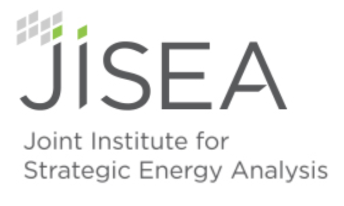JISEA Catalyzers will Incubate Clean Energy Research Capabilities
May 7, 2021—To bolster its vision of solving future energy challenges, the Joint Institute for Strategic Energy Analysis (JISEA) has launched the JISEA Catalyzers, an initiative focused on accelerating the clean energy transition through collaboration. The JISEA Catalyzers will be operated in partnership with JISEA's founder, the National Renewable Energy Laboratory (NREL).
The JISEA Catalyzers will bring together thought leaders from JISEA and NREL to leverage energy analysis, projects, data, and tools within specific research areas, each led by a principal investigator. Each catalyzer will be incubated for 1–2 years before being launched into a new NREL-led program.
"JISEA has a legacy of breaking down silos and collaborating across diverse sectors," said JISEA Director Jill Engel-Cox. "The JISEA Catalyzers will create a community of experts to map synergies, vet ideas, and launch thriving research programs."
Accelerating Research Capabilities
The vision for the JISEA Catalyzers started several years ago, as research has grown to answer more complex, multidimensional questions with the clean energy transition.
“The breadth and depth of research emerging at NREL and JISEA is astonishing,” said Juan Torres, associate laboratory director of NREL’s Energy Systems Integration Directorate, where JISEA lives. “The JISEA Catalyzers will help NREL develop new capabilities to address national energy challenges.”
By enhancing connections across the energy research ecosystem to meet emerging challenges, the JISEA Catalyzers will launch new crosscutting capabilities to achieve clean energy goals at speed and scale. Analytical insights will help design large-scale concepts for future research, mapping pathways to a global clean energy economy.
Inaugural Catalyzers

Garvin Heath (left) and Michael Martin (right), principal investigators of the Energy and Atmospheric Systems Catalyzer
Each catalyzer will be anchored to one of NREL's key research areas—integrated energy pathways, electrons to molecules, and circular economy for energy materials—and will build the foundation for new research areas. The two inaugural catalyzers focus on energy and atmospheric systems and sustainable communities, which grew out of emerging capabilities at JISEA/NREL and stemmed from research questions of growing importance.
The Energy and Atmospheric Systems Catalyzer, led by JISEA analysts Garvin Heath and computational scientist Michael Martin, will explore the multidirectional relationships across climate, air quality, and energy systems. Climate and air quality challenges are driving global transitions in power, transportation, industry, buildings, and product design. Clean energy technologies will be affected by a changing atmosphere and will impact atmospheric systems in more ways than reduced carbon dioxide emissions. The Energy and Atmospheric Systems Catalyzer will focus on understanding these interactions to maximize the sustainability of future energy systems.

Megan Day, principal investigator of the Sustainable Communities Catalyzer
The Sustainable Communities Catalyzer will explore how scaling up clean energy integration, electrifying economies, and transforming energy systems will impact land use, economies, people, and the environment. "All of these changes will occur at the community level," said Megan Day, JISEA analyst and principal investigator of the Sustainable Communities Catalyzer. "Through the Sustainable Communities Catalyzer, we will work to map pathways for sustainable clean energy transitions with a focus on rural and disadvantaged communities."
Help Catalyze Innovation
You can help catalyze innovation. We are looking for sponsors, partners, use cases, and expert review panel members and practitioners across industries and sectors within our inaugural catalyzers. Please contact us if interested.
Back to JISEA News >
